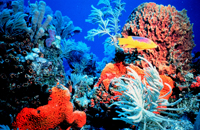NOAA Research Expedition Seeks Details of Coral Disease Impacts in Florida Keys National Marine Sanctuary
August 11, 2008

Spanish hogfish at reef.
High Resolution (Credit: NOAA)
Scientists from NOAA’s Florida Keys National Marine Sanctuary and partnering research institutions will embark on a nine-day research expedition Aug. 8 aboard the NOAA Ship Nancy Foster to monitor the health of coral reefs along almost 200 miles of the Florida Reef tract, the largest coral reef in the continental United States.
Researchers from NOAA, Auburn University, George Mason University, Harbor Branch Oceanographic Institution, and Mote Marine Laboratory will look for evidence of coral disease and bleaching at approximately 50 research stations from Key Largo to the Dry Tortugas. Scientists have been visiting the sites annually since 1997.
“Coral reefs play a vital role in sustaining the health of our oceans and our economy,” said sanctuary superintendent Dave Score. “The data NOAA and our partners are gathering this year will bring the scientific community one step closer to understanding the causes of reef decline, including regional stressors that influence coral diseases and their connection to climate change.”
A variety of factors have contributed to the deterioration of reef health worldwide over the past three decades, but coral disease and bleaching are among the least understood. Scientists and resource managers will use these data to analyze trends in reef health over time and to prioritize management and research needs.
NOAA understands and predicts changes in the Earth's environment, from the depths of the ocean to the surface of the sun, and conserves and manages our coastal and marine resources.
